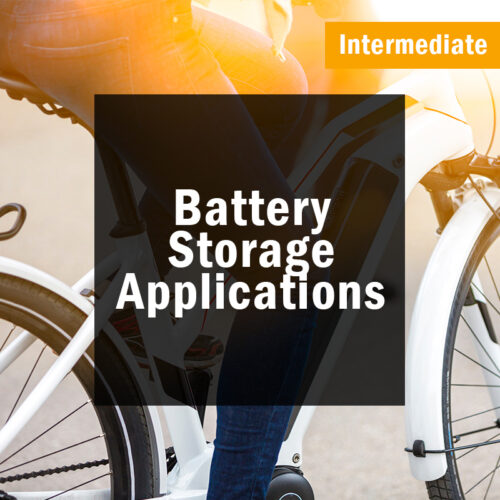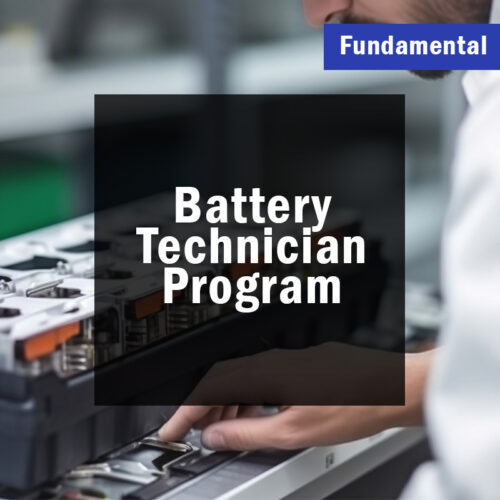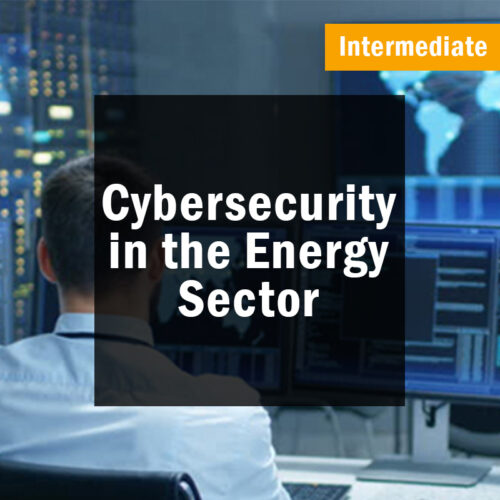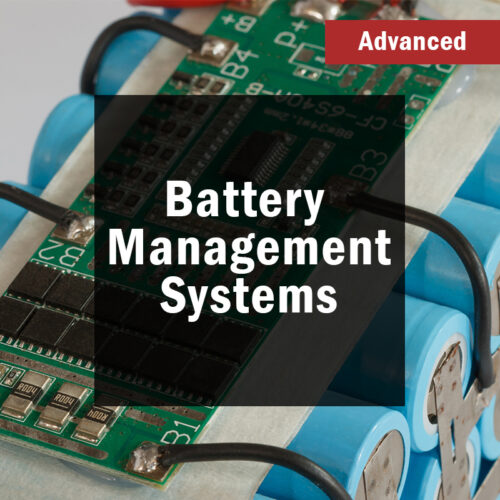-
 This certificate will allow participants to dive deep into power conversion systems that connect storage systems to smart grids and consumers, learning how to choose the right type of converter while assessing overall system performance with respect to energy efficiency. It also introduces battery management systems and the critical parameters that we can control, the use of battery testing and operation simulation in order to predict real-world in-service behavior.
This certificate will allow participants to dive deep into power conversion systems that connect storage systems to smart grids and consumers, learning how to choose the right type of converter while assessing overall system performance with respect to energy efficiency. It also introduces battery management systems and the critical parameters that we can control, the use of battery testing and operation simulation in order to predict real-world in-service behavior. -
 This certificate focuses on real-life applications that will contribute to achieving in practice a low-emission, sustainable future. It gives a deep understanding of battery storage applications across the electric grid, behind-the-meter, storage for electrical mobility, and for industrial applications.
This certificate focuses on real-life applications that will contribute to achieving in practice a low-emission, sustainable future. It gives a deep understanding of battery storage applications across the electric grid, behind-the-meter, storage for electrical mobility, and for industrial applications. -
 The Battery Storage Basics certificate empowers learners with the basic knowledge and insights to build up their understanding of the importance and working principles of battery technologies. They will learn how batteries fit in the energy context, what is their historical importance, and explore different perspectives and classification of current battery technologies. Learners will then look into the core components and parameters of batteries and battery systems. Lastly, they will be guided through different battery technologies that are currently in use.
The Battery Storage Basics certificate empowers learners with the basic knowledge and insights to build up their understanding of the importance and working principles of battery technologies. They will learn how batteries fit in the energy context, what is their historical importance, and explore different perspectives and classification of current battery technologies. Learners will then look into the core components and parameters of batteries and battery systems. Lastly, they will be guided through different battery technologies that are currently in use. -
 This certificate explores the potential role and position of battery storage in the future European electricity industry, by shedding light on different applications of battery storage. For each of the four main applications of grid-scale, behind-the-meter, off-grid and mobility, you will learn about the most promising services of battery storage in the electricity system that has a large share of renewable electricity. You will discover why the development and deployment of battery storage has been slow, despite it being a promising solution, but also why the time has come for the electricity industry to make smart battery choices.
This certificate explores the potential role and position of battery storage in the future European electricity industry, by shedding light on different applications of battery storage. For each of the four main applications of grid-scale, behind-the-meter, off-grid and mobility, you will learn about the most promising services of battery storage in the electricity system that has a large share of renewable electricity. You will discover why the development and deployment of battery storage has been slow, despite it being a promising solution, but also why the time has come for the electricity industry to make smart battery choices. -
 This certification provides a rock-solid overview and understanding of the battery value chain, production processes, and end-of-life scenarios. Specifically, participants will explore the battery raw materials, understand how a Li-ion battery is produced, evaluate how to regain value from end-of-life batteries learning about state-of-the-art scenarios related to batteries end-of-life in particular re-use and recycling.
This certification provides a rock-solid overview and understanding of the battery value chain, production processes, and end-of-life scenarios. Specifically, participants will explore the battery raw materials, understand how a Li-ion battery is produced, evaluate how to regain value from end-of-life batteries learning about state-of-the-art scenarios related to batteries end-of-life in particular re-use and recycling. -
 This certificate empowers to expertly assess the challenges, the main drivers and the business opportunities of a changing energy system at different levels of the market. Participants will get a perspective on policy and regulation frameworks as a crucial part of any investment decision and strategy, and will discover real business examples from leading companies that are ground-breaking in their sector.
This certificate empowers to expertly assess the challenges, the main drivers and the business opportunities of a changing energy system at different levels of the market. Participants will get a perspective on policy and regulation frameworks as a crucial part of any investment decision and strategy, and will discover real business examples from leading companies that are ground-breaking in their sector. -
 Equip yourself with essential skills in battery technology through this comprehensive certification. Designed for professionals in renewable energy, electrical mechanics, and engineering, this course covers designing, operating, testing, maintaining, and replacing battery cells and packs. Gain practical experience, learn to choose the right battery technology, and ensure safe handling and disposal of battery systems. Stay ahead in the evolving battery industry with this critical certification.
Equip yourself with essential skills in battery technology through this comprehensive certification. Designed for professionals in renewable energy, electrical mechanics, and engineering, this course covers designing, operating, testing, maintaining, and replacing battery cells and packs. Gain practical experience, learn to choose the right battery technology, and ensure safe handling and disposal of battery systems. Stay ahead in the evolving battery industry with this critical certification. -
 This mini-certificate discusses different methods for battery testing. The importance of testing, related standards, needed testing infrastructure and analysis tools are individually tackled. This series also highlights how the output of battery testing is viable for battery modelling that supports the battery use phase and can possibly be implemented on battery management systems.
This mini-certificate discusses different methods for battery testing. The importance of testing, related standards, needed testing infrastructure and analysis tools are individually tackled. This series also highlights how the output of battery testing is viable for battery modelling that supports the battery use phase and can possibly be implemented on battery management systems. -
 This certificate aims to equip organizations with knowledge and skills to evaluate IT risks and typical vulnerabilities in the context of energy systems. Methods to avoid attacks, amongst other things exploiting human factor related risks, are described and learners will get to know approaches for dealing with security /privacy issues when designing energy data systems (Security /Privacy-by-Design). Imparting an overview of the European legal frameworks and a deeper look into country-specific regulation that have to be considered while building smart grid business models.
This certificate aims to equip organizations with knowledge and skills to evaluate IT risks and typical vulnerabilities in the context of energy systems. Methods to avoid attacks, amongst other things exploiting human factor related risks, are described and learners will get to know approaches for dealing with security /privacy issues when designing energy data systems (Security /Privacy-by-Design). Imparting an overview of the European legal frameworks and a deeper look into country-specific regulation that have to be considered while building smart grid business models. -
 This mini-certificate explains how a lithium-ion cell can be designed, sized, and produced for a specific capacity and energy. The key steps in the selection and production of the main components of the cell, i.e. electrodes, separator, and electrolyte, are discussed. The slurry formulation, mixing, coating, drying, calendaring, cutting, stacking, electrolyte formulation/injection, sealing/packing, and formation cycles are detailed both in terms of machineries and the processing parameters.
This mini-certificate explains how a lithium-ion cell can be designed, sized, and produced for a specific capacity and energy. The key steps in the selection and production of the main components of the cell, i.e. electrodes, separator, and electrolyte, are discussed. The slurry formulation, mixing, coating, drying, calendaring, cutting, stacking, electrolyte formulation/injection, sealing/packing, and formation cycles are detailed both in terms of machineries and the processing parameters.



